This step by step woodworking article is about outdoor plant stand plans. We show you how to build a simple 3 tier plant stand, using common tools and quality lumber. If you want to keep the costs under control, buy pressure treated lumber, otherwise you could enhance the look of the outdoor stand by using quality lumber such as cedar, redwood or water-resistant pine. Make sure all the wooden boards are perfectly straight and in a good condition, paying attention to potential flaws, such as: twists, decays or wanes.
We recommend you to work on a level surface, if you want to get the job done in a professional manner. In addition, check the corners for squareness after each step described in this tutorial. Prevent the lumber from splitting by pre-drilling holes and leaving at least 1/2” from the edges. If you use wood glue to enhance the bond of the joints, make sure you clean the excess with a dry cloth. See all my Premium Plans HERE.
Projects made from these plans
Cut & Shopping Lists
- A – 2 pieces of 2×4 lumber 50”, 2 pieces of 2×4 lumber 60” – cut at 30º at both ends LEGS
- B – 1 pieces of 2×6 lumber 33”, 2 pieces of 2×6 lumber 10 3/4” TOP SHELF
- C – 2 pieces of 2×4 lumber 33” long BACK SUPPORT
- D – 2 pieces of 2×4 lumber 40 1/2” long, 2 pieces of 2×4 lumber 28 1/2” BRACKETS
- E – 7 pieces of 2×4 lumber 40” long, 3 pieces of 2×4 lumber 33” long SLATS
- F – 40 pieces of galvanized decking screws 2 1/2” long SCREWS
Tools
![]() Hammer, Tape measure, Framing square
Hammer, Tape measure, Framing square
![]() Miter saw, Drill machinery, Screwdriver, Sander
Miter saw, Drill machinery, Screwdriver, Sander
Time
Wooden Plant Stand Plans

Plant-stand-plans
Building a plant stand is a straight forward job, even for an amateur builder with little expertise in the field. In order to get the job done by yourself in a professional manner, you should buy quality materials and take accurate measurements.
Top Tip: Drill pilot holes in the lumber before inserting the screws, to prevent the wood from splitting. Align the components at both ends and use a spirit level to make sure the shelves are horizontal.
Outdoor Plant Stand Plans
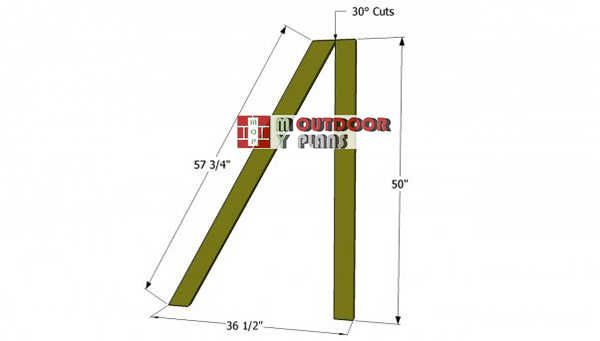
Building-the-legs-for-the-plant-stand
First of all, you should build the four legs of the plant stand, using the information from the list of materials. As you can see in the image, cut both hands of the angled leg at 30º, to provide a good support to the wooden stand. Use lumber designed for outdoor use, if you plans to place the stand in your backyard.
Top Tip: Smooth the cut edges of the legs, using a sand block and medium-grit sandpaper.
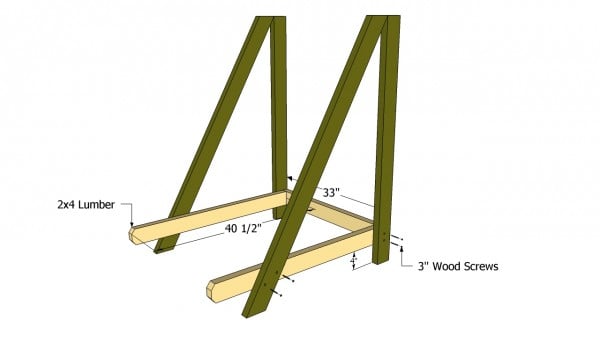
Installing the bottom supports
Continue the project by attaching the bottom brackets and the back brace. Therefore, build the wooden components from 2×4 lumber, making sure you double check all the measurements. Clamp the brackets to the legs and drill pilot holes. Afterwards, countersink the head of the screws and insert 2 1/2” wood screws.
Top Tip: Plumb the sides of the plant stand using a spirit level, before securing the back brace. Leave about 4” from the ground to the brackets.
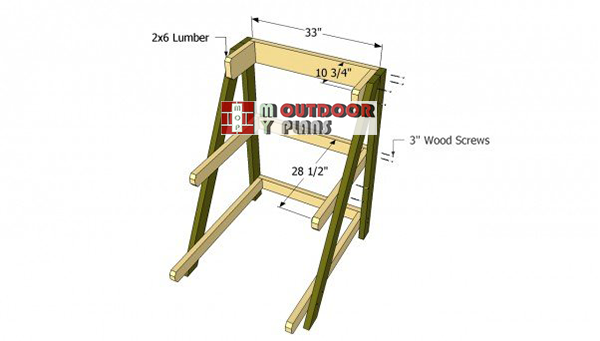
Attaching the shelf frame
Next, install the top brackets and the top back support. Proceed in the same manner described above, making sure you pay attention to the alignment of the components. Adjust the position of the mid shelf, according to your needs.
Top Tip: Drill pilot holes in the legs before inserting the screws, if you want to obtain a neat look. Make sure the brackets are perfectly level before securing them into place.
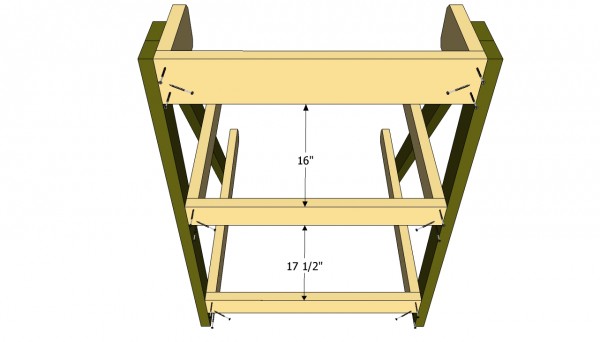
Plant stand – back view
In order to make the structure rigid, we recommend you to fit the back braces, as you can see in the image. Build the top support from 2×6 lumber, while the the rest of the support should be built from 2×4 lumber.
Top Tip: Secure the back supports to the brackets, as well as to the wooden legs. Make sure the back of the plant stand is plumb, as well as its sides, using a hand level.
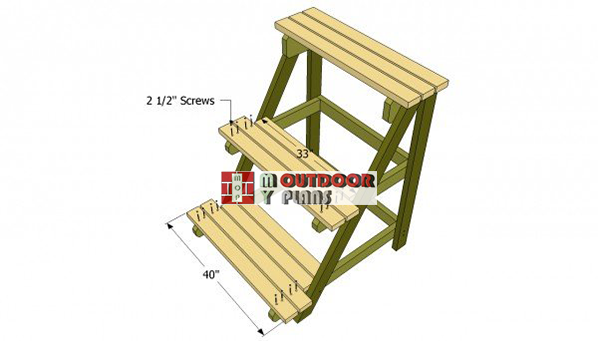
Attaching-the-shelves
After building the frame of the outdoor stand, you need to attach the slats into place, as to make the three shelves. As you can see in the image, you could adjust the width of the shelves according to your needs, so make sure you study this aspect thoroughly.
Drill pilot holes in the 2×4 boards, in order to avoid wood from splitting. Countersink the head of the screws, to build a stand with a neat appearance.
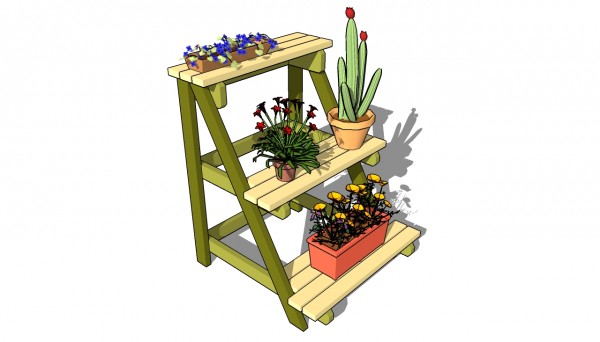
Outdoor plant stand plans
Last but not least, you should take care of the finishing touches. Therefore, fill the holes with a good wood putty and let it dry out thoroughly for several hours. Sand the wooden surface with 120-grit sandpaper and clean the residues with a dry cloth.
Top Tip: Protect the plant stand from rot, by applying several coats of primer. Afterwards, stain the wood with the desired color.
This woodworking project is about outdoor plant stand plans. If you want to see more outdoor plans, check out the rest of our step by step projects and follow the instructions to obtain a professional result.





9 comments
There is one wrong measurement.
If the angle is 30°, the distance between the insides of the leg is:
SIN(30°) * 50″ = 25″
Then you have to add the width of 1 2×4, so 4″.
And finally and the width of the cut of the other 2×4:
4″/COS(30°) = 4.6″
Now, the distance shown between the outer parts of the legs should be:
25 + 4 + 4.6 = 33.6″ and not 36.5″ as shown.
I’ll be using your diagram nonetheless 🙂
2×4 lumber is actually 1.5 x 3.5 My calculations are accurate. Sorry for letting you down, though.
Nice plan, I’m going to build it. Instead of using 2x material, I plan to use 1x material. Should it be a problem?
No, it will work.
Some time ago I saw some plans for a mobile plant stand much like this one. Now I just can’t find it! Any ideas??
What do you mean by mobile?
Just printed off and getting ready to buy lumber tomorrow
I see it says 1 5/8 screws but I don’t see on plans
Also looks like you need 3” screws as well
Could you nail it instead of screw?
Yes, of course. But screws are better.